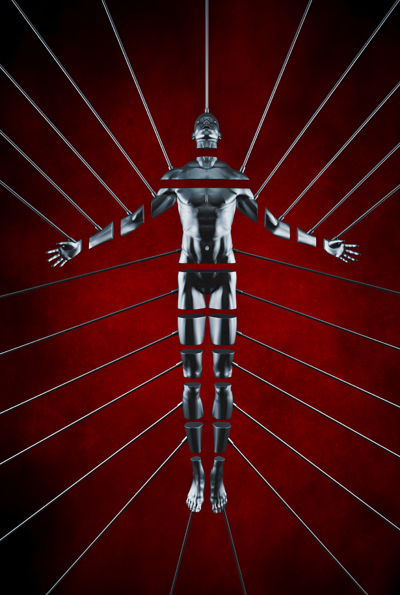
|
Recently I wrote about human freedoms in the form of a commandment, about not denying the agency of a human being.1 And that makes good sense when dealing with the average person in the average political or social situation. But is there ever a time when someone or a society may—in fact must—deny another person their right to act?
I think we can agree that a human being always has the right to think and to speak as a free agent. This right includes the unfettered ability to perceive one’s environment, interpret to the best of their ability what is going on, and make judgements about what they see and hear. And it includes the right of the rest of us to hear what that person is saying or to ignore it, interpret their meaning if we choose to, and judge it as proper and useful or not.
But the right to act as a free agent may be circumscribed under certain conditions. I can think of at least two.
Questions of Competence
Let’s start with the lowest form of competence. A person who is brain dead cannot be granted the benefit of human agency. They will at best be unconscious and under intensive care, lest their body die for lack of nourishment or other necessary functions. Beyond that, brain dead equals dead, and the dead have no agency.
A person who has lost their conscious reason, their ability to perceive and interpret, to remember and function in even the simplest, least demanding setting, whether through stroke or a cognitive disease like Alzheimer’s, will be gravely disabled. They may not be able to feed, bathe, and clothe themselves. They may be under periodic or constant supervision. In these cases, society has ruled that the person may be placed in an environment where care can be given. And, for their own protection, that environment may be locked against their leaving, because they may not understand that they cannot survive on their own in the outside world. If such a person was formerly deemed competent but now is demonstrably not so, then the courts or other societal function may assign a conservator to inventory the person’s assets and distribute them for the person’s benefit. This is a humane denial of a person’s agency.
Higher up the competence scale is the person whose actions intermittently reflect a loss of what the rest of society considers “conscious reason.” Such a person may have ideas that others do not share, or they may see and hear sounds, people, or influences in their environment that other, more “normal” people do not perceive. They may, in the language of California’s Welfare and Institutions Code 5150, become a “danger to self or others.”2 In California and eight other states, such a person may be taken into custody and involuntarily held for observation. In California, the initial observation period is 72 hours, after which the person must be brought before an administrative law judge, and the custodial authority must show why the person may be held for a longer period. That longer period is for a total of 14 days, after which another hearing may be held, and the involuntary hold may then be extended for a further 14 days. After that, the person must be released, regardless of his or her mental condition.3
Whether people who are mentally different from the rest of society—delusional, hallucinating, psychotic, or even violent—should be restrained against their will is a question that is currently under debate. We used to “institutionalize” them, locking them away in hospitals where they might or might not get appropriate care but would certainly be given heavy medication to keep them docile and quiet. That is now considered a form of abuse. But many people with a severe mental illness, a brain disorder that distorts their thinking and leads to inappropriate actions, usually also have a condition called “anosognosia,” which leads them to think that they are not ill and do not need help. And many civil rights organizations defend the human agency of mentally ill people and protest against their involuntary treatment, even under a court order, and even if that means they will be homeless and scavenge for food, clothing, and shelter.
And at the top of the competence scale, at least in my view, is the person who abuses alcohol and/or mind-altering drugs so that they are temporarily impaired and, perhaps over a long period of continuous use, permanently mentally damaged. Such a person may have the ability to resist the temptation to use their drug of choice, to control their usage, or even wean themselves into a state of continued sobriety. Whether they chose not to exercise that ability—being granted complete human agency—and so decline into disability, or they choose to exercise it and so become a consistently rational and dependable human being, is a question of will and intent.
Questions of Hostile Action
An unimpaired person may still act in ways that the rest of society deems unacceptable. They may have the use of their conscious reason, but they choose to violate the rules that the larger society has put in place. They defraud people, they abuse others in their care, they steal, they murder, and they disobey the driving laws with harmful consequences. It would be nice if the rest of us could have a frank discussion with them and show why such actions are not to everyone’s benefit—including theirs. But such people, whom we call “criminals,” have a different sense of themselves and their own rights, usually against the rights of others.
It is proper to examine their allegedly criminal actions in a court of law, to give them a chance to explain themselves and show why they should not have been charged or should not be convicted: they didn’t do it, didn’t have complete competency, were under some compulsion, or have other reasons. Our laws are designed to give such people the benefit of doubt. And it is human to give them a chance to make amends and not continue in their previous course of action.
But once a person has proven that giving them complete autonomy and granting them unfettered human agency will only lead to further infractions, then society may be required—indeed must be required—to remove them from commingling with the rest of us. Exile to another country that might be willing to take them—where they will have continued freedom and agency to pursue their interests—is one possible course. Incarceration under punitive conditions, where agency is curtailed and leaving is not an option, is another option.
Whether a person is gravely incompetent or intentionally hostile, restricting their freedom of action and so denying their human agency in whole or in part would not then be a violation of the commandment to preserve human agency. Every rule has its exceptions, and that is what makes human beings the species that has conscious reason in the first place.
1. See Human Agency from January 29, 2023.
2. WIC 5150 also includes the state of being gravely disabled, which has been interpreted as a person being “unable to provide for his or her basic personal needs for food, clothing, or shelter” due to a mental health disorder or impairment. However, this condition is sometimes subject to interpretation, whereby a homeless person who scavenges in a garbage can or eats roadkill is considered able to provide for his or her food and so is not disabled.
3. This total of 28 days is the basis for most court-ordered drug and alcohol rehabilitation processes under involuntary conditions. To involuntarily hold a person for longer would require a criminal prosecution—and that’s a whole ‘nother court case.
